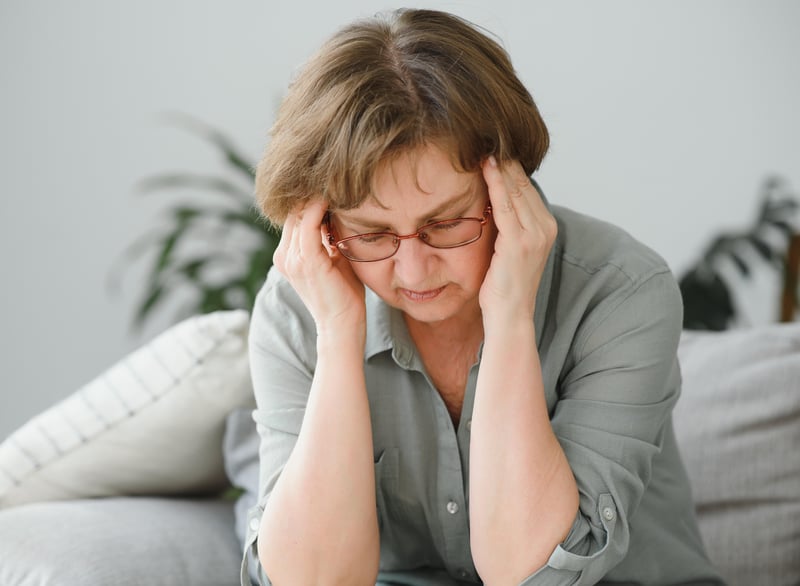Get Healthy!

- Amy Norton
- Posted August 31, 2023
More Stress, Higher Odds for A-Fib in Women After Menopause
Postmenopausal women who are stressed, depressed or have trouble sleeping may face an increased risk of a common heart rhythm disorder, new research suggests.
The study, of nearly 84,000 women over the age of 50, found that certain psychological factors were linked to the risk of developing atrial fibrillation, or a-fib -- a heart arrhythmia that can cause serious problems over time.
The higher the women scored on two measures of "stress" and "strain," the greater their risk of developing a-fib over the next 10 years. Two specific factors -- stressful life events and insomnia -- showed the strongest connection to the heart condition.
The findings highlight the role of mental well-being in physical health, according to an expert not involved in the study.
"Don't let anyone tell you it's 'just' stress," said Dr. Nieca Goldberg, a cardiologist and clinical associate professor at NYU Grossman School of Medicine in New York City. "Our psychological health impacts our physical health."
The study, published Aug. 30 in the Journal of the American Heart Association, does not prove stress and strain directly contribute to atrial fibrillation.
But there is reason to believe they can, according to Goldberg, who is also a volunteer expert with the American Heart Association.
"Stressful life events raise stress hormones like epinephrine and norepinephrine, and elevated levels may trigger arrhythmias like atrial fibrillation," Goldberg explained.
Similarly, she added, insomnia and other sleep disorders can tax the body -- raising blood pressure, for example -- and studies have linked them to increased risks of heart arrhythmias.
Atrial fibrillation occurs when the heart's upper chambers begin to quiver chaotically instead of contracting effectively. The arrhythmia is not immediately life-threatening, but it's not benign, either: If it persists over time, it can lead to complications like stroke or heart failure.
A-fib is common and on the rise: The U.S. Centers for Disease Control and Prevention projects that 12 million Americans will have the condition by 2030.
There are well-known physical risk factors for a-fib, including older age, high blood pressure, obesity and diabetes.
But they are not the whole story, said study first author Dr. Susan Zhao, an associate chief of cardiology at Santa Clara Valley Medical Center in San Jose, Calif.
In her medical practice, Zhao said, she sees older female patients who are in "picture-perfect health" go on to develop a-fib.
What they do tend to have in common, according to Zhao, is what she calls the "a-fib personality." That is, they often ruminate, worry about losing control, have trouble sleeping and are generally "high-strung."
But there has been little research into the role of psychological factors in driving atrial fibrillation, so Zhao and her colleagues decided to investigate.
They turned to data from a U.S. government study called the Women's Health Initiative that began in the 1990s and involved thousands of women between the ages of 50 and 79.
The researchers focused on over 83,700 participants who were free from a-fib when they entered the study. At that point, the women were asked questions about their health, lifestyle and psychological well-being.
Over the next decade, about one-quarter of those participants developed a-fib. And Zhao's team found that two distinct "clusters" of psychological factors were related to the risk of a new a-fib diagnosis -- even after they accounted for physical health conditions.
The clusters were dubbed "stress" and "strain," and for every additional point the women scored in those groupings, their average risk of a-fib inched up by 3% to 7%.
Drilling down, the researchers found that stressful life events and insomnia were the two factors most strongly linked to a-fib. Those life events included experiences like major financial trouble, divorce, job loss, serious family conflicts and death of a spouse.
Zhao said she hopes the findings boost awareness of the impact of psychological well-being on women's heart health.
The "take-away message," she added, is that mental health deserves the same attention as physical health.
Goldberg agreed, saying that chronic stress, sleep problems and depression symptoms are all "important health issues" that women should bring up with their doctor.
Poor sleep or daytime sleepiness, Goldberg noted, can be related to an underlying disorder like sleep apnea. So women can ask their doctor to be evaluated for such conditions.
The good news, Goldberg said, is that sleep disorders, depression and chronic stress can all be addressed -- whether through lifestyle changes, talk therapy or other treatments.
More information
The American Heart Association has advice on stress management.
SOURCES: Susan Zhao, MD, associate chief, cardiology, Santa Clara Valley Medical Center, San Jose, Calif.; Nieca Goldberg, MD, clinical associate professor, NYU Grossman School of Medicine, New York City, and volunteer expert, American Heart Association; Journal of the American Heart Association, Aug. 30, 2023, online







